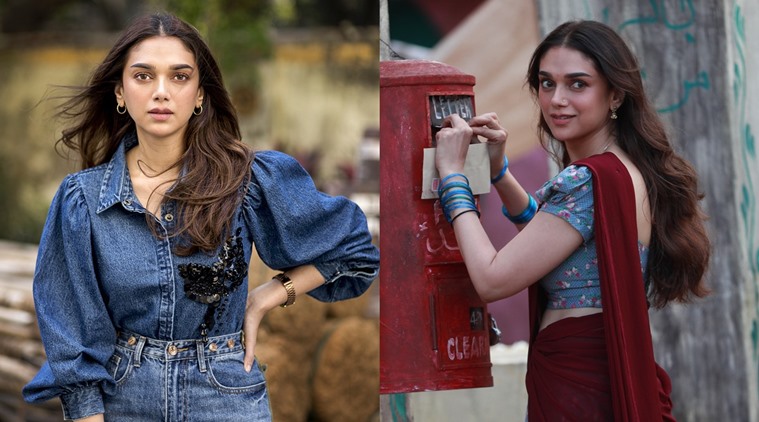 Aditi Rao Hydari starrer Sufiyum Sujatayum will begin streaming on Amazon Prime Video from July 3.
Aditi Rao Hydari starrer Sufiyum Sujatayum will begin streaming on Amazon Prime Video from July 3.
Aditi Rao Hydari is quite upbeat about her upcoming movie Sufiyum Sujatayum, which is set to premiere on Amazon Prime Video this Friday.
In an exclusive conversation with indianexpress.com, she opens up about her working experience with a young crew led by director Naranipuzha Shanavas.
You play a mute character in Sufiyum Sujatayum. Does having no dialogues help you to express and perform better?
I really enjoyed not having a language to communicate. If I am being silly about it, I will say Malayalam is very difficult as a language. And I would have found it very difficult to learn the lines. I feel like we hide behind the language and we don’t look at people when we speak. But, when you don’t have a language to hide behind, you have to look into a person’s eyes. And that person will see exactly what you think and what you feel. I think that honesty is so beautiful. And Sujata is to me is the embodiment of that innocence of true love.
Do you think dialogues sort of slows down the flow of performance?
I will never say it slows down the performance. Of course, dialogues can be so beautiful and they can mean so much. That’s why certain dialogues are so famous. But, connecting without having to say a word is very beautiful. There is vulnerability and there is also fearlessness. Looking into somebody’s eyes is very vulnerable, because they can see exactly what you are thinking. But, if you allow somebody to look into your eyes and your soul, you are the most courageous person.
Vijay Babu said that finding an actor who could play Sujata in the 20s and the 30s was a tough task. Did you feel the same challenge while playing the part?
Sujata is a dancer. You can’t train somebody to look like a dancer. I have watched movies where certain actors are playing dancers, but I know being a dancer that they don’t even walk like a dancer. To effortlessly play a dancer, you have to be a dancer. There is no way you can learn that. One, she had to be a dancer. Two, she had to look 21 and then 32 effortlessly. Actually, not so much difference in the character’s physicality. But, you should be able to convey the emotional change of the person in those years. Also, that childlike innocence should be intact despite everything that’s happening. I think you can’t teach anybody to do that. It has to be there inherently.
What kind of groundwork did you do for Sufiyum Sujatayum?
I had to learn sign language. They (filmmakers) had sent a sign language teacher to me in Mumbai and I worked for 10 days with the teacher. And you can’t master sign language in 10 days. The teacher was there every single day on the sets to help me with all kinds of doubts. But, how can you learn emotions and feelings? Ultimately, any part is about making your audience feel something. I have to feel it and (then) I have to make you feel it.
Sufiyum Sujatayum is visually appealing. What do you think about Shanavas’ work as a director?
Shanavas lived with the script for a very long time. I feel a lot of respect for somebody who has a lot of conviction. It is a conviction to the point that it is stubbornness. It can be frustrating at times. But, you can never doubt their intentions. And his intentions are as honest as the film. Of course, there were some teething problems. I am used to coming on the sets and completely surrendering to the director and their vision. In this case, the director had a very strong vision, but we had to work together to understand it. There was general trust and understanding. Shanavas was very close to the subject. From the stroke of the mehndi to the way a curtain must fly in a particular scene, he was clear about all the details.
How do you choose your projects?
The most important thing that I look at is – do I keep this person in the heart? Will the audience go home with this person in their heart, and keep thinking about this person for a long time? I think that is a clincher for me. To me, length does not matter. I have done films like Padmaavat. I am happy to do that as long as the audience will take me in their heart along with the boy.